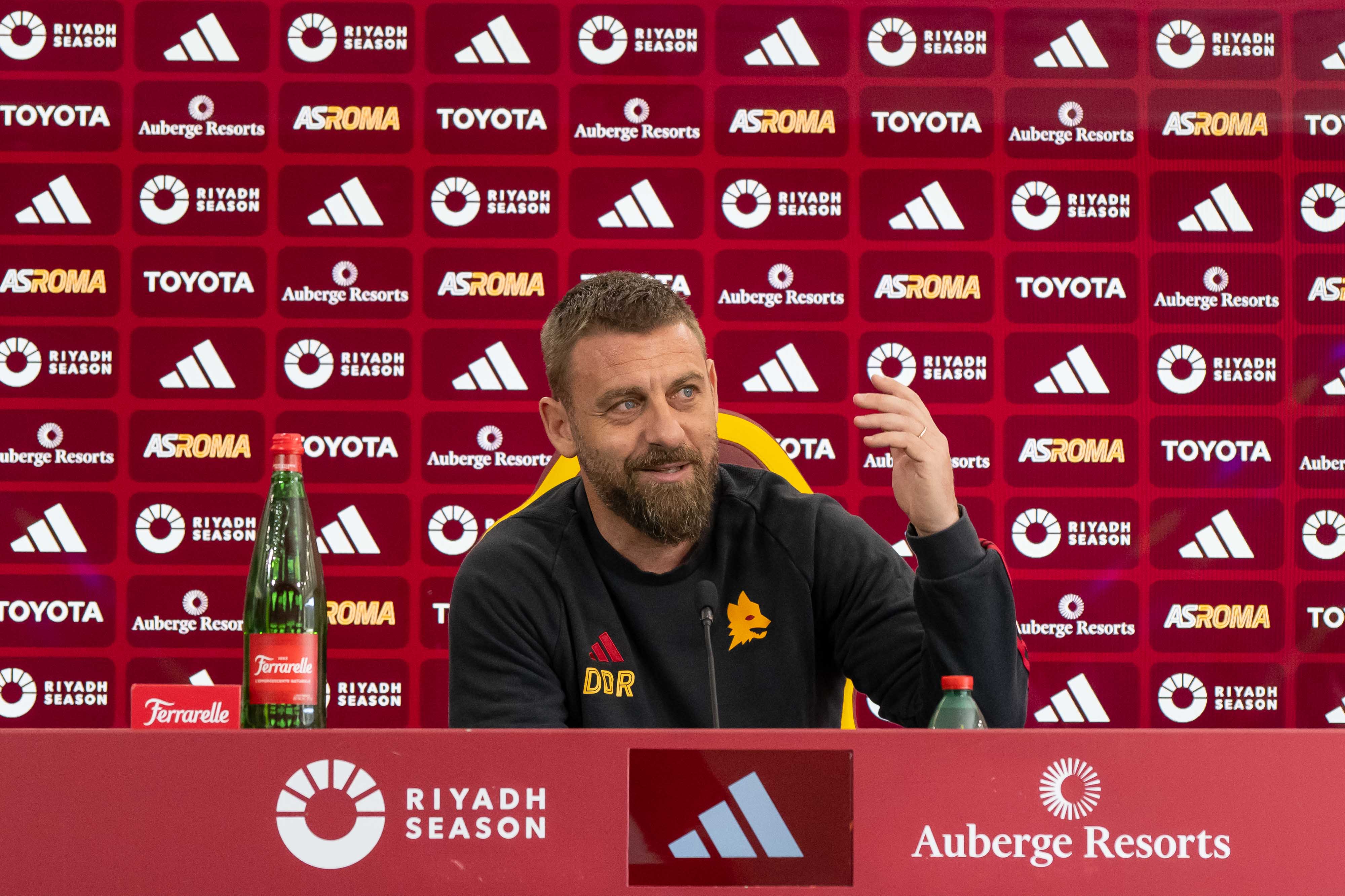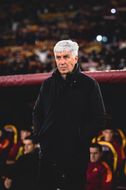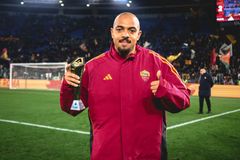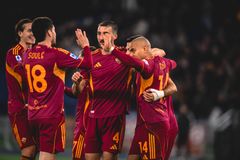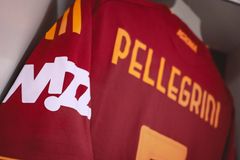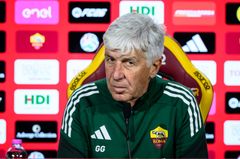
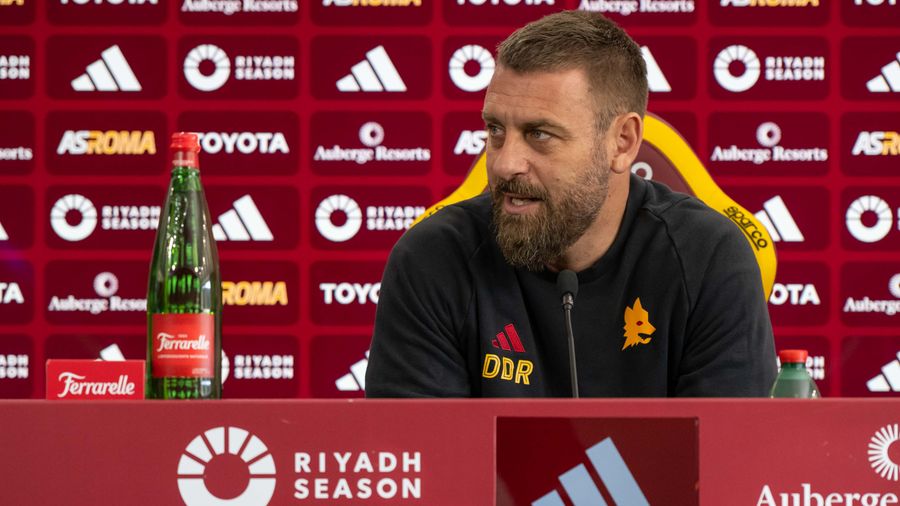
Here’s what the boss had to say.
How are the players approaching the game? How different is it being a coach?
“It’s different, it really is. Over the years, I got quite good at managing it. I’ve realised that, besides the position I’m in, I think age gives you an advantage because I feel quite calm today, despite the excitement over such a great game.
“The lads are approaching it well. They’re keeping calm and working hard. We’re looking for that balance. We want to get fired up for it but not go too over the top so that we waste our energy too early. We obviously don’t want to be too fired up when we get on the pitch either”.
Are there any particularly positive or negative derbies that stick in your mind from when you were a player?
“There are so many. There were so many fantastic nights, and others that weren’t as great. If you play for a club for 20 years, you can’t pretend that you’ve only got good memories.
“Given that today is the first, I think back to the first derby I played in which I was subbed on and [Amantino] Mancini scored that back-heel goal. At the end of that game, I really thought I was the happiest guy in the world. It was such an amazing feeling. I was a young lad, I think I was 20. These are things you don’t forget though. So much went on that to just choose one moment would be reductive. I played so many derbies. In the first few years I found it difficult. It was probably the only game that I’d get nervous for. In time, I started to properly play them, whether I did well or not. But I didn’t really ‘play’ the first three or four derbies”.
Does being familiar with the derby make it easier or harder to prepare? Is the physical or mental preparation more important for a match like this?
“You’ve got to prepare in every way. You need to prepare for it like a normal match, knowing that there won’t be the normal consequences and it won’t bring the same stress as a Roma v Sassuolo game. It’s different.
“Especially for us, recently there’s not been a very positive past when it comes to the derby. I read some figures that honestly as a fan I couldn’t remember. Zero goals in the last three or four derbies.
“For the lads that played those games, there’s a bit of a desire for revenge. We need to feed that but not too much. We’ve got a match to prepare for against a great team. Lazio are great and we need to remain level-headed so we can be a team too”.
Roma’s attack have created a lot of chances since you took charge, but in recent games you’ve only managed one goal. Can this be attributed to Paulo Dybala’s absence, or is that just a coincidence? How are your attackers doing?
“In the last three games we’ve scored two goals. Three games ago, we scored two goals in Florence."
I’m including Brighton, so three games in all competitions.
"Ah OK. I think that even against Lecce, which was one of the worst matches we've played, we created three or four goalscoring opportunities. These included a couple of really good chances and a few that could’ve turned out better. Aside from that, we didn’t turn four or five potential scenarios into goalscoring chances. Then you’ve also got to remember that Lecce themselves created chances.
“These things can happen in matches. The same goes for the Sassuolo game – despite not playing our best we could’ve scored a lot of goals. I don’t think that we’ve got any issues in attack. Everyone is fine, except [Sardar] Azmoun. I’m feeling confident.
“In any football game it’s not just the attackers – or players in other positions - who make goals happen. Goals are a consequence of team play. In the games we’ve played well and the games we’ve won we attacked as a team, and we’ll continue with this approach.
“As for [Tammy] Abraham, we'll see how training goes and what the medical staff who’ve been working with him have to say, what they recommend. Then we’ll find out whether he needs more days of training with the team or whether they'll give us the green light to call him up. From what we can see, he's fine, he’s doing everything the rest of the players are doing. However, when it comes to such long-term injuries there are deadlines to be followed. Sometimes you need to rigorously stick to these while in other cases the timeframes can be shortened, but only when you see positive developments. We’ll see where we’re at with Tammy today.”
You’ve always said that you’re close to the owners, the CEO and the president. Were there any discussions during the international break regarding your future?
“They gave their thoughts. We had discussions about the future of Roma in terms of the short-term, looking ahead to the rest of the season. But I see what you’re getting at with your question…
“The international break served as an opportunity to discuss the most important future decision for us – what will happen in two months' time".
What kind of Lazio side are you expecting? Might Mattia Zaccagni's absence and where Felipe Anderson plays influence your selections?
“Are you sure Zaccagni won’t play? I’m not aware of that”.
Yes, he’s definitely out.
“Right. We can’t speculate on that because we don’t have total certainty on who’s fit or not. These are the kinds of games where you grin and bear pain, so maybe he’ll pull through and feature anyway.
“We’re not speculating about Lazio, instead we’re focusing on ourselves. We do know that we’re facing a team with a coach who’s only two games into his tenure at the club. He’s got his own philosophy which I think he’s trying to pass on to his players.
“We won’t be up against a team which will play like his Verona side for the full 90 minutes, because it might take time for his ideas to bed in. The two sides he’s fielded have been strong and we could face a mixture of these two line-ups.
“We’re preparing our tactics based on what we’ve seen and what I think he’ll do. We can’t make accurate judgements on their line-up given there’s so little to go by.
“There are so many things which you include in your preparations. Sometimes you’ll pick one player or another based on the opposition’s line-up. For example, if they select a big lad up front you’ll consequently field the tallest defender you have in your squad to deal with him. Alternatively, they might pick a less defensively-minded player in one position and as a result you’ll target that area of the pitch, or vice versa.
“But we won't change, we won't change ourselves. We've never done so, although if you’re up against some very special players you’ll make adjustments accordingly. We’ll approach the match in a similar way to our most recent ones".
What type of coach is Tudor?
“We both replaced the previous coaches and didn't have much time to work. Especially with the cups in between, we didn’t have many training sessions. He obviously less than me.
I have great respect for Igor, I think he is an important coach, with a very specific idea. He comes from a group of coaches who perhaps have Gasperini as their founder. I think he is an intelligent coach, because he knows that one can’t plan a type of football like in Verona with all players and teams. Maybe he will adapt to the team he has found".
.
The approach to the match: in Florence, with Sassuolo but also in Lecce we saw three dull first halves, by your own admission.
“We talked about these things, but I think there are tactical situations to address for these matches. At the beginning, you used to tell me that we were dropping in the second half. Perhaps we focused too much on the second half and then were weaker in the first (laughs, ed.).
Jokes aside, certain things need to be addressed. I think that my post-Fiorentina analysis was also an end in itself, when I said that 'yes, we made a mistake, we played with three men', and then we saw that in Lecce we struggled with four men. I think it's a situation that needs to be addressed from game to game.
I know what problems we faced in certain matches, but I also think that we are talking about Serie A, and in Serie A - knowing where we started from, knowing the situation we found ourselves in two months ago, a situation of objective difficulty - facing an easy match in Lecce, Florence, and Turin wouldn’t have been easy.
Maybe Inter can do it, or maybe not. There are the opponents. I think it's quite normal to struggle for one half in Florence: we saw how hard it was for Atalanta in the Coppa Italia the other night, which is an incredible team.
It's right for us to think about what we do wrong, what we can improve on, but to have a more complete picture we should also analyze our opponents: to you, Lecce may seem like a minor team, but it's difficult to go and play there, for the characteristics of its players, for the preparation they did for the match, for the importance that those points had on their home pitch and also for the objective environmental difficulty: there was a lot of wind, the pitch was very hard. These are small factors that, put all together, can lead you to struggle. Then, in my opinion, apart from a few counterattacks we conceded, in the first half we suffered but in the second we were already back to being another team".
I wanted to know what type of approach you have with the referees and if you have spoken about it with the Club. Do you have a strategy with the Club?
“I don't have a strategy, I manage the referees and I allow the time this issue deserves, because I can't improve the referees, I can't train the referees, I can't have them make the right decision the next time. This is not what the coaches want, they want a favorable decision (the coach smiles, ed.).
And then when what happened in Lecce happens, which for me is clearly a damage, sometimes it can be analyzed and sometimes not. There are moments in which these things need to be analyzed and said in the press room and others in which you don't want to talk about the ref because you want to focus on other things. You don't want the players to think it's the referee's fault, because there are so many other things to improve before the referee.
I think I am, as a player first and as a coach now, a person who knows how to hold a proper conversation, and not one who gets confused by a negative or positive result, or by the advantage or disadvantage you gain from a referee's decision.
I think I can talk to them on the pitch. I don't protest like others do: when one of my players throws the ball out, I don't raise my hand and say that the throw-in is for us. I try to protest only in the face of evidence. Sometimes, the evidence isn't real.
But in this case we were right. We have tablets and you see everything immediately. So, you feel a little free to protest a bit more. But I'll stop there.
The Club also talks to me about this, we face these discussions on a daily basis. We did it with Lina (the CEO Soulouku, ed.) and Maurizio (Lombardo, the Chief Football Operating Officer, ed.) two days ago. One makes decisions, takes a position, gets in the way if an episode like the one in Lecce is repeated every week.
I think it was the second episode in Italy that could have been decided differently, after the one in Florence. There's nothing sensational for now, I'm not worried about the referee's decisions.
I am more worried, as I said in the post-Lecce, about the way the regulations are managed and handled. As footballers, apart from training, they should use us as “test animals” to make football a better and more playable sport. There is no one in the world who knows how to recognize the extent of a contact, the importance of a foul, its tactics, more than a player. Footballers, and especially former footballers, should join with referees who have great experience in order to draw up a more recognizable regulation, because the gray area is the one that bothers us the most, which creates the most controversy.
The phrase I hear many times is: if the penalty was awarded, it means it was a penalty, but not having awarded it means that it wasn't. And this is a very convenient, but very dangerous contradiction".
There is the derby, but there is also Milan-Roma: should you manage certain players?
“In the first two months here, that were as important as the next ones, I didn't manage them particularly, apart from those returning from injuries. In this first phase, therefore, management may consist of paying special attention to those who have just recently suffered a longer or a shorter-term injury.
I exploited Dybala himself enough, he played 90 and 110 minutes in a few days. Obviously, the way we manage the players occurs before the match: we have to train him so that he can push during the match without feeling pain. Same thing for Spinazzola.
In the first phase of this reconditioning, we will try to avoid playing 90, 90, and 90 minutes because it could be a problem. But we will evaluate it from time to time. They are big guys, they know how to talk and be aware of their bodies, I think it’s also an advantage for them to find a staff open to discussion.
We should not get any more injuries. But we have a large squad and we have confidence".

 Tickets
Tickets
 Shop
Shop













